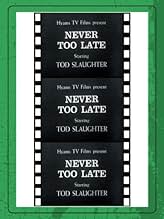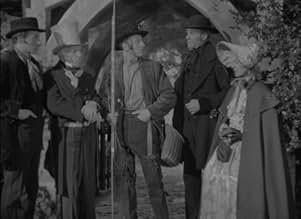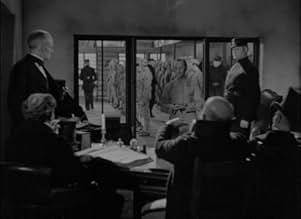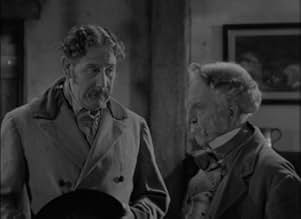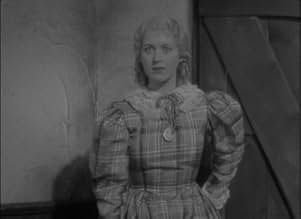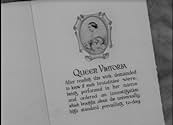Agrega una trama en tu idiomaAn evil prison administrator cruelly abuses the inmates at his prison, until one day the tables are turned.An evil prison administrator cruelly abuses the inmates at his prison, until one day the tables are turned.An evil prison administrator cruelly abuses the inmates at his prison, until one day the tables are turned.
- Dirección
- Guionistas
- Elenco
John Singer
- Matthew Josephs
- (as Johnny Singer)
Cecil Bevan
- Prison Inspector
- (sin créditos)
Leonard Sharp
- Henry Bradshaw
- (sin créditos)
Douglas Stewart
- Prison Inspector
- (sin créditos)
Mavis Villiers
- Betty
- (sin créditos)
Jack Vyvyan
- Innkeeper
- (sin créditos)
Opiniones destacadas
Never Too Late is a typical Tod Slaughter vehicle in some ways but is also certainly the most serious-minded of his films. In it, once again, Slaughter lusts after a woman young enough to be his daughter, while concocting up a dastardly scheme to take her fiancé out of the picture. This kind of specific plot-line underpinned the majority of Slaughter's other Victorian melodramas. Where this one deviates from the norm is that it also incorporates a plot thread that takes a withering look at the prison system in Britain of that time. It shows life in these prisons to be a succession of horrors, with the inmates treated appallingly and the governors acting immorally. It's this social awareness that is a little unusual for a Slaughter melodrama but it does quite effectively make its point about the unpleasantness of the system.
Slaughter himself is once again very much the star draw though, here he plays a character called Squire John Meadows and it's a role that once again allows this great - now pretty obscure – actor to flex his acting chops. His style is the opposite of subtle and is hammy to the max. But it is difficult to play this over-the-top so well and it's a testament to Slaughter's abilities that his fully committed performances are so engaging to watch. In this one, it's perhaps his final moments that stand out the most, where, as he is dragged away by the authorities, he screams insanely at the young woman he has lusted after that her fiancé will leave her! It's a bizarre and manic display and a great way for his unhinged character to bow out of the film. On the whole, this is yet another example of why this great British actor should be rediscovered and reappraised.
Slaughter himself is once again very much the star draw though, here he plays a character called Squire John Meadows and it's a role that once again allows this great - now pretty obscure – actor to flex his acting chops. His style is the opposite of subtle and is hammy to the max. But it is difficult to play this over-the-top so well and it's a testament to Slaughter's abilities that his fully committed performances are so engaging to watch. In this one, it's perhaps his final moments that stand out the most, where, as he is dragged away by the authorities, he screams insanely at the young woman he has lusted after that her fiancé will leave her! It's a bizarre and manic display and a great way for his unhinged character to bow out of the film. On the whole, this is yet another example of why this great British actor should be rediscovered and reappraised.
How can something be original yet old hat at the same time? It's just another Tod Slaughter film, produced by George "Quota-Quickie"-King back in the 1930's/1880's. Slaughter was a unique talent, during his lifetime never out of work but if remembered at all today by the critical Artheads, ridiculed. Well it's their loss so nothing to worry about, but for people with open minds I recommend watching some his films for something probably completely different from their experience. He has been the only true barnstorming melodramatic actor in the movies, with plenty of intentional and unintentional copycats but no one bettering him, as much of a one-off for example as Jimi Hendrix was. His films were a heady brew of over-the-top and hackneyed melodrama deliciously and lovingly hammed up by the entire cast, especially the usually Machiavellian Slaughter.
Slaughter is the evil leering moustache-twirling Squire machinating for the affections, or marriage and what comes afterwards anyway, of the local farmer's innocent curly-haired daughter. She loves a staunch young true blue Englishman with a square chin and the game is on for the Squire to remove any opposition to his nefarious scheming. On the way a true blue English poacher is sent to prison and boy does he Mend! The descriptions of harsh prison life by the author Charles Reade, and Dickens too of course, pricked a few consciences and woke up the Victorian capitalist class to the wasting of their unearned money on unnecessary and expensive torturing of the inmates of such places. They thought to save money by not turning prisons into sadistic death camps and as a by product saving the miscreant's body as well as soul. One day our lovely modern prisons will have hardly any warders at all, mainly robots and computers looking mechanically over the few people who've done something bad enough to get locked up.
My normally cynical daughter remembered to boo and hiss in the right places, and we cheered at the sudden denouement when all the dark clouds rolled if not flew by. It's not compulsory but it can help get in the right frame of mind while watching this cheap but genuinely lovingly-crafted Victorianesque adaptation of the famous Victorian novel.
Slaughter is the evil leering moustache-twirling Squire machinating for the affections, or marriage and what comes afterwards anyway, of the local farmer's innocent curly-haired daughter. She loves a staunch young true blue Englishman with a square chin and the game is on for the Squire to remove any opposition to his nefarious scheming. On the way a true blue English poacher is sent to prison and boy does he Mend! The descriptions of harsh prison life by the author Charles Reade, and Dickens too of course, pricked a few consciences and woke up the Victorian capitalist class to the wasting of their unearned money on unnecessary and expensive torturing of the inmates of such places. They thought to save money by not turning prisons into sadistic death camps and as a by product saving the miscreant's body as well as soul. One day our lovely modern prisons will have hardly any warders at all, mainly robots and computers looking mechanically over the few people who've done something bad enough to get locked up.
My normally cynical daughter remembered to boo and hiss in the right places, and we cheered at the sudden denouement when all the dark clouds rolled if not flew by. It's not compulsory but it can help get in the right frame of mind while watching this cheap but genuinely lovingly-crafted Victorianesque adaptation of the famous Victorian novel.
Never Too Late (1937)
** 1/2 (out of 4)
Insane, over the top and sometimes hilarious Tod Slaughter movie. Slaughter plays a psychotic Justice of the Peace who falls in love with a farmer's daughter but she wants nothing to do with him. She's in love with another guy but Slaughter will go to all ends to make sure they don't marry. Slaughter has the nickname "The British Bela Lugosi" due to his over the top performances but I personally find this an insult to Lugosi and American horror films. Lugosi went over the top quite a bit but never in the way Slaughter does, which makes his films watchable but also hurts them. His over the top style kills the melodrama in the film but it helps the campy horror side. The highlight of the film has to be the prison torture stuff because it's just so damn funny due to Slaughter's wildness.
** 1/2 (out of 4)
Insane, over the top and sometimes hilarious Tod Slaughter movie. Slaughter plays a psychotic Justice of the Peace who falls in love with a farmer's daughter but she wants nothing to do with him. She's in love with another guy but Slaughter will go to all ends to make sure they don't marry. Slaughter has the nickname "The British Bela Lugosi" due to his over the top performances but I personally find this an insult to Lugosi and American horror films. Lugosi went over the top quite a bit but never in the way Slaughter does, which makes his films watchable but also hurts them. His over the top style kills the melodrama in the film but it helps the campy horror side. The highlight of the film has to be the prison torture stuff because it's just so damn funny due to Slaughter's wildness.
In It's Never Too Late to Mend, Tod Slaughter plays yet another despicable villain, Squire John Meadows, who doesn't exactly twirl his moustache, but does stroke it quite a bit. The squire has his beady eyes set on pretty Susan Merton (Slaughter's regular co-star Marjorie Taylor), but she is in love with penniless farmer George Fielding (Ian Colin). Not one to give up, the squire tries to have Fielding (wrongly) arrested for poaching, but the farmer's best friend Tom (Jack Livesey), who George once rescued from a frozen lake, owns up to the crime to repay his debt.
Before the squire can come up with another dastardly scheme, George sets sail to Australia to make his fortune, promising Susan that he will return to marry her in two years. While George is away, the squire, who is justice of the peace and runs the local prison with an iron rod, makes life a misery for poor Tom; he also intercepts and destroys letters between George and Susan, and spreads rumours that George has found a wife in Australia. With Susan's father's approval, the wicked man proposes marriage to Susan, but is shocked to learn that George has returned from Oz and is now a wealthy man...
Once again, it is Slaughter's pantomime performance that makes this film so watchable: he is the epitome of slimy Victorian villainy, rubbing his hands with glee and chuckling with laughter as he treats other humans with utter disdain. In the prison, he delights in punishing 15-year-old Matty Josephs, imprisoned for stealing bread to feed his starving mother, and insists on personally lashing inmates with the 'cat'. Those who complain are thrown in 'the hole', a windowless cell where the occupant slowly loses their mind. If he were alive today, Tod would be perfect to play Dick Dastardly in a live-action Wacky Racers.
Based on a book by Charles Reade, which exposed the dreadful conditions in Victorian prisons and prompted reform, It's Never Too Late to Mend is a condemnation of corporal punishment, and a morality play with religious overtones, Tom helped through his darkest hour by the prison chaplain, and the sadistic squire winding up as an inmate in his own hell-hole (you reap what you sow). Ultimately, though, it's another opportunity to witness one of cinema's greatest unsung actors, the wonderfully wicked Tod Slaughter, at his very best.
6.5/10, rounded up to 7 for IMDb.
Before the squire can come up with another dastardly scheme, George sets sail to Australia to make his fortune, promising Susan that he will return to marry her in two years. While George is away, the squire, who is justice of the peace and runs the local prison with an iron rod, makes life a misery for poor Tom; he also intercepts and destroys letters between George and Susan, and spreads rumours that George has found a wife in Australia. With Susan's father's approval, the wicked man proposes marriage to Susan, but is shocked to learn that George has returned from Oz and is now a wealthy man...
Once again, it is Slaughter's pantomime performance that makes this film so watchable: he is the epitome of slimy Victorian villainy, rubbing his hands with glee and chuckling with laughter as he treats other humans with utter disdain. In the prison, he delights in punishing 15-year-old Matty Josephs, imprisoned for stealing bread to feed his starving mother, and insists on personally lashing inmates with the 'cat'. Those who complain are thrown in 'the hole', a windowless cell where the occupant slowly loses their mind. If he were alive today, Tod would be perfect to play Dick Dastardly in a live-action Wacky Racers.
Based on a book by Charles Reade, which exposed the dreadful conditions in Victorian prisons and prompted reform, It's Never Too Late to Mend is a condemnation of corporal punishment, and a morality play with religious overtones, Tom helped through his darkest hour by the prison chaplain, and the sadistic squire winding up as an inmate in his own hell-hole (you reap what you sow). Ultimately, though, it's another opportunity to witness one of cinema's greatest unsung actors, the wonderfully wicked Tod Slaughter, at his very best.
6.5/10, rounded up to 7 for IMDb.
Not surprisingly, this is a very good Tod Slaughter film. Much better than I anticipated. Slaughter does not disappoint - nor does the rest of the cast, directing and story.
Slaughter plays Squire John Meadows, a cruel man that is head of the prison (justice of the peace)and provides plenty of creative punishments for the inmates: straight-jackets, near starvation, whips and more. What's worse he's found a way to try to imprison an innocent man in order to pursue the man's lady friend.
Lovely use of shadows as only B&W films can capture, wonderful cinematography, a cruel story, excellent performances by the cast. This is a worthwhile drama - it's no masterpiece but it is good.
8/10
Slaughter plays Squire John Meadows, a cruel man that is head of the prison (justice of the peace)and provides plenty of creative punishments for the inmates: straight-jackets, near starvation, whips and more. What's worse he's found a way to try to imprison an innocent man in order to pursue the man's lady friend.
Lovely use of shadows as only B&W films can capture, wonderful cinematography, a cruel story, excellent performances by the cast. This is a worthwhile drama - it's no masterpiece but it is good.
8/10
¿Sabías que…?
- ConexionesFeatured in El manicomio (1988)
Selecciones populares
Inicia sesión para calificar y agrega a la lista de videos para obtener recomendaciones personalizadas
Detalles
- Tiempo de ejecución1 hora 10 minutos
- Color
- Relación de aspecto
- 1.37 : 1
Contribuir a esta página
Sugiere una edición o agrega el contenido que falta

Principales brechas de datos
By what name was It's Never Too Late to Mend (1937) officially released in Canada in English?
Responda
